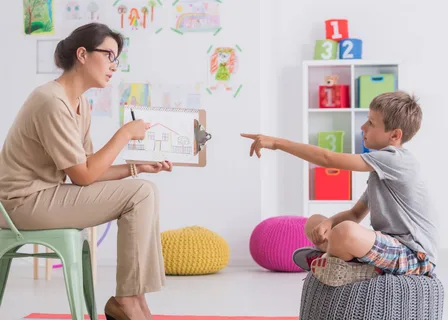Child and adolescent therapy are one of the most underrated therapies worldwide. Like adults, children and teens also go through bad mental states where they need child and adolescent therapy, but unfortunately, no one understands it. Therapists and counselors have now taken a step in which they aim to provide child and adolescent therapy to children and teens.
For the Child:
Experiencing growth has never been easy. In the early years of life, emotions can run high, and routine changes can greatly impact a child’s mental health. Child and adolescent therapy works with children to educate them and develop skills so they can manage daily life independently. Once a child/teenager becomes pro at managing daily life independently, he/she can deal with stress and depression proficiently.
As the teenage years are the foundational years of one’s character, low self-esteem and confidence can negatively impact a child’s future development. Child and adolescent therapy educates teens and children on the mechanisms and dynamics that give them a safe outlet to speak openly about their experiences and frustrations.
For the Family:
Child mental health problems can also affect the family as a whole. Parents who are uneducated about mental health issues may feel unprepared and unequipped to help their kids. The communication gap between the parents and the kid also causes familial rifts. Child and adolescent therapy is the only solution to eliminate the stressful situation when more family members are indulged in a situation. When a child seeks child and adolescent therapy, parents are also present to help the therapist understand what their child is going through.
Child and adolescent therapy helps children understand the importance of communication with the family members and how effectively they can communicate with them, especially in turbulent situations such as death. The therapists ensure that the communication methods told to the child and their family members enhance understanding among the family members.
When is Child and Adolescent Therapy Needed?
Every child is born with different talents and capabilities, which means every child is unique in one way or the other. We all have different responses to every situation in the world.
1) Bullying:
It’s an unfortunate occurrence a child has to go through in schools, or at times, close family is also part of bullying. There can be several reasons for a child being bullied. Some of the most common issues of a child being bullied are short height, black skin color, overweight, religion, nationality, academically weak, and many more. Regular bullying of a child results in low confidence, negatively impacting a child’s self-image. Bullying also causes physical harm, which is extremely worst for a child. Children who can not deal with bullying often attempt suicide.
2) Divorce:
Divorce can be as hard for both parents as well as children. Sometimes parents can be too close to a situation where they can help their children to work on things that are creating barriers between them. At times family members play a significant role in destroying a marriage. This is where the couple feels the need for therapy so that the therapist can help them recover from the issues they encounter.
3) Anxiety, Depression, and Mental Health Issues:
Parents aren’t always equipped to help children with mental health issues. A professional can educate a child to cope with their anxiety or depression and advise parents on how best to support their child going forward. A child’s diagnosis isn’t always straightforward, either. The CDC reports that 73.8% of children aged 3-17 with depression also have an anxiety diagnosis.
4) Traumatic Events:
All children will react differently to experiencing a traumatic event. Still, in most cases, professional help eases the stress surrounding the situation and teaches children and adolescents how to process such events.
5) Acting Out of the Ordinary:
Has your once social child become a hermit? Are they eating less than usual? Any behavior that differs from their norm could indicate that your child is struggling. Aggression, anxiety, academic decline, and substance abuse indicate that they need therapy sessions and could benefit from seeking professional assistance.
Advantages of Child and Adolescent Therapy:
1- Positively Express Thoughts and Emotions:
Children and teenagers tend to hide their thoughts and emotions because of guilt feelings, inability to handle personal issues, low self-confidence, or peer pressure. That’s why some children experience regular nightmares, overeat, and tend to express themselves by destroying toys, killing animals, or setting fires. Don’t wait for a problem to grow worse. Child therapy should be implemented. A trusted and reputable psychologist or a counseling center, such as People Psychology, can help you.
2) Rule Out Problems Without Force or Pressure:
Sometimes, parents can’t determine exactly the reason for the behavioral change, tantrums, or poor school performance. Your child might be afraid to talk to you or don’t want to be a cause of frustration and disappointment. Feelings of shame, loneliness, hopelessness, and unresolved personal issues or problems may result in psychological issues. Before it’s too late, it’s important to rule out these problems through child therapy, such as behavior therapy.
3) Child Counseling Makes Your Child Happier:
Children who generally can express themselves are happier than those who can’t. By ruling out the source of your child’s negative behavior and objectively addressing concerns and issues without force or pressure, your child will feel more comfortable talking about his feelings. As a result, your child feels more comfortable and happier talking to you about issues and problems in the home or school.
4) Strengthens Parent-child Relationship:
Child counseling is beneficial for both the child and the parent. You and your child will learn more positive ways to communicate and deal with problems. Your child will trust you more if you are more open to communication. The surprising result of counseling is a stronger parent-child relationship.
Conclusion:
If you feel your child has started unusual behavior or does not communicate, it’s time to seek child and adolescent therapy. If your child does not consult a therapist, the situation might get worse, and with time, you will lose control.
For More Blog Visit TechCrums















































